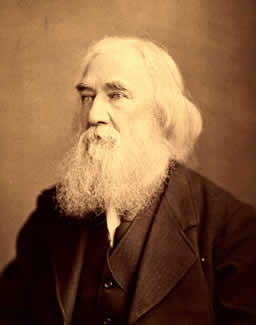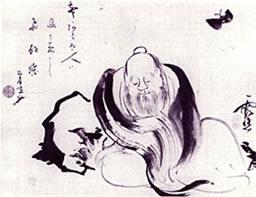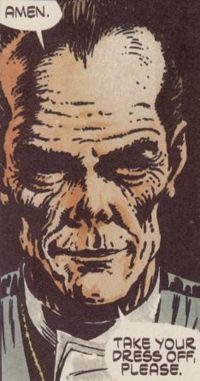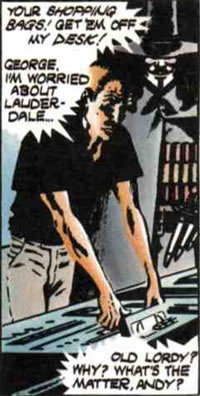Is V an Anarchist?
Quick-Jump
[Note, all page references refer to V for Vendetta except where noted otherwise.]
Introduction
Is V an anarchist? At first, this question may appear rhetorical. “Of course V is an anarchist!” we might proclaim. But if we do not analyse the matter in close detail, how can we ever be positive?
In order to determine whether V is in fact an anarchist, we must compare his objectives with the objectives of the anarchist, and, more importantly, analyse V’s means for achieving his goals—for, if his means are not in concert with libertarian ethics, V’s ends will not justify his unlibertarian means. Moreover, in order to make these necessary comparisons, we must first know what anarchism is.
What is Anarchism?
First and foremost, it must be stressed that anarchism is not lawlessness. While anomie means “without rules,” anarchy means “without rulers.” Further, the difference between leaders and rulers must be noted: While leaders may be chosen by an individual and abandoned at will by the same individual without the consent of anyone else, rulers are those specific kinds of leaders whom are imposed or whom impose themselves upon nonconsenting subjects. Anarchism makes no prohibition on the existence of leaders per se, but rather merely requires a prohibition on all rulership.
It is unfortunate that people confuse anarchy, a system in which spontaneous order would flourish, with the chaos of anomie. They do so primarily because they have never taken the time to learn what anarchism actually is. This leads many to assume falsely that anarchists are naturally violent people, and that anyone describing herself as a peaceful anarchist, or who uses the term peaceful anarchy, must be some sort of utopian. Those who do not understand anarchism often ask, “How would we prevent violence without laws?” without bothering to consider that perhaps we can have law without granting a monopoly to a law-enforcement agency, without creating a political class.
Anarchy is not a utopia. While utopias cannot exist in the real world, decentralised methods of combating violence can. Further, unlike Leninism, anarchism does not require the impossible task of altering human nature, of creating some “New Soviet Man.” Rather, anarchism conforms itself to work with woman’s and man’s nature, recognising that humans are motivated by what economists call “rational self-interest.”
Many anarchists, such as Lysander Spooner, were highly influenced by the classically liberal conception of natural law and natural rights. This is the view that rights are not granted by some higher power like “society” or “the state” (or even from “God,” although not all anarchists are in agreement here), but rather that humans have individual, inalienable, innate rights by virtue of their nature as human beings. Spooner’s Natural Law; or The Science of Justice makes a marvellous case for the existence of natural or universal principles of justice.
So, as we see, whereas anomie means without rules, anarchy means without rulers. In fact, these states of existence are diametrically opposed to one another, for any system that prohibits rulership necessarily promotes rules, most specifically the rule that there may be no rulers.
So what is anarchy? Anarchy is that system that forbids any and all aggression, where aggression is defined not as the use of force per se but rather the initiation of force specifically. If person A attacks person B and person B uses equal and opposing force to defend herself from person A, it is person A who is the aggressor, not person B. Thus, the anarchist would find person A’s actions to naturally be criminal, while she would find person B’s actions to be perfectly within the (natural) law. This prohibition on aggression, what we call the nonaggression axiom, is the whole of the law in an anarchy, and enforcement of this law would effectively eliminate all coercive hierarchies.
To put it another way, whenever Jack rapes, steals from, or murders Jill, Jack is committing an act of aggression against Jill, and thereby creating a coercive hierarchy with Jack as lord and Jill as serf, with Jack as master and Jill as slave, with Jack as sovereign and Jill as subject. When this takes place, anarchy (in the specific locale of the crime) ceases to be, having been replaced instead by archy, by the establishment of what we can call “a state.” Anarchy is only restored when the criminal, Jack, pays restitution to Jill, restoring to Jill what is rightfully hers and providing extra compensation for Jill’s loss of time preference. In the case of rape, Jill may demand a non-monetary punishment if she wishes, such as having Jack’s penis cut off. Further, if she wishes to pull a gun on her would-be rapist to prevent his vile act of aggression, I believe this is also fine. Moreover, I have nothing against the execution of murderers as long as (A) the victim consents to the execution, as long as (B) the murderer is truly guilty of murder, and as long as (C) the execution is not committed by a state. (Not all anarchists agree with me on the permissibility of execution, of course, and that’s perfectly fine. We are free to disagree with one another. Thus, the anarchopacifist like Leo Tolstoy or Robert LeFevre would reject all retaliation against aggressors, advocating instead a policy of turning one’s cheek. One doesn’t have to be a pacifist to be an anarchist, although one does have to be an anarchist to truly be a pacifist.)
So, anarchism does not prohibit retaliatory violence, only initiatory violence. There is, of course, one caveat to this: responsive force must be proportional to the aggressive force. So, while Jack can be said to be violating the rights of Jill when Jack steals from Jill her bubblegum, and while we can say that it is permissible for Jill to use some modicum of force so as to re-obtain her bubblegum, she nevertheless may not execute Jack for his crime. Such a punishment would not be remotely proportional to the crime, as I’m sure virtually all who read this can concur. Responsive violence must be proportional to the initiatory violence, and when it is not, the punisher ceases to be an agent of justice and becomes instead an agent of crime. (See Murray N. Rothbard, The Ethics of Liberty, pp. 80–81, 85.)
Those who remain concerned that anarchism is some form of utopianism may very well follow up this discussion with the question, how could this prohibition on aggression be enforced without a state apparatus? One of three ways seem apparent. Keeping in mind that anarchism does not prohibit retaliatory violence, and only prohibits initiatory violence, a person may choose to (A) employ the rather inefficient method of defence whereby she sits all day on her front porch with a shotgun, (B) form a Community Watch or simply make a deal with her neighbour that she will look after his property is he looks after hers, or (C) hire a protection agency for her protective needs. This third option may be the most practical, and because private protection agencies will have to do a superb job at keeping their customers safe so as to not lose customers to competing private protection agencies, it only stands to reason that they will be far more effective and efficient than a government-monopoly police agency.
Mr. Benjamin Ricketson Tucker
This idea of private protection agencies is not a new one. While the earliest exposition for private security I have found comes is in the French liberal economist Gustave de Molinari’s 1849 work The Production of Security, one of my favourite quotes on the subject comes from the nineteenth century American anarchist, Benjamin R. Tucker, who, in describing anarchists, writes that they
are simply unterrified Jeffersonian Democrats. They believe that “the best government is that which governs least,” and that that which governs least is no government at all. Even the simple police function of protecting person and property they deny to governments supported by compulsory taxation. Protection they look upon as a thing to be secured, as long as it is necessary, by voluntary association and cooperation for self-defence, or as a commodity to be purchased, like any other commodity, of those who offer the best article at the lowest price. In their view it is in itself an invasion of the individual to compel him to pay for or suffer a protection against invasion that he has not asked for and does not desire (Benjamin R. Tucker, “State Socialism and Anarchism”).
Finally, anarchists believe that legitimate property (as opposed to illegitimate property claims) can only be acquired in three ways: (A) through homesteading something unowned, (B) through receiving a piece of property from a previous just owner as a gift, or (C) through receiving a piece of property from a previous just owner through trade. If a person has justly acquired a given piece of property, then taking or altering that property without the owner’s consent is nothing less than usurpation, than theft. (For example, if you are a farmer who has homesteaded a previously-unowned plot of land through mixing your labour with the soil, and I come onto your land and spread salt thereupon without your consent, I have thereby violated your rights, and have usurped from you control over your land.) Taking or altering a legitimately-owned property without the consent of the owner is an act of aggression, an act that thus establishes a coercive hierarchy, where the taker or alterer is the master and the legitimate owner is the slave. Wherefore the goal of anarchists is the disestablishment of all coercive hierarchies, anarchism cannot condone the usurpation of justly-acquired, justly-held property.
But, anarchists recognise that there are also unjust property claims, i.e., claims to “property” that has been acquired through aggressive or political means. Any means of acquiring “property” outside of the three valid methods listed above is, naturally, illegitimate, as every method outside of the three listed above requires some sort of aggression, which is prohibited by anarchist ethics. Any person, firm, or organisation that acquires “property” through some means other than these three naturally lacks legitimate ownership, and thus those pieces of “property” obtained illegitimately ought to properly be consider unowned and up for the taking.
Anarchists believe that, without the state, its whimsical edicts, and its institutionalisation of aggression, spontaneous order would arise, an order that is peaceful and productive. Although the concept of spontaneous order dates back to the Taoists, the first modern thinker to pick up on the concept was the French anarchist Pierre-Joseph Proudhon, who famously stated that anarchy is order. (Spontaneous order, which bears relation to Adam Smith’s conception of the “Invisible Hand,” was also heavily promoted by the Austrian economist and liberal Nobel Laureates F. A. von Hayek.) Thus, the goal of the anarchist is to see the demise of chaos and the state, and to bring about the ascension of society into an anarchy, i.e., a system that eschews aggression and the coercive hierarchies that can only spring therefrom.
The vital key, then, is that anarchism is strictly and objectively opposed to aggression in all forms, where aggression is recognised properly as the initiation of force or fraud against the person or justly-acquired property of another.
Are V’s Goals Anarchistic?
As to whether V’s goals are anarchistic or not, we must ask ourselves, does V promote what I have elsewhere described as “omniarchy”, or does he instead promote peace and order?
If anarchy is a system in which no one rules over anyone, “omniarchy” would be the opposite: a system in which every person rules over everyone else. Those in an “omniarchist” commonwealth would find themselves in a state of anomie, with no constraints on their activities. At any second, they may murder, or may be murdered; may rape, or may be raped; et cætera. It would be, in short, a Hobbesian war of all against all.
Do As You Please
Due to V’s reference to a “Land of Do-As-You-Please” (p. 195) one may come to the conclusion that V in fact is the sort of anomist who wishes to promote the omniarchistic hierarchy of all over all, and is thus not properly an anarchist. However, methinks this would be a hasty misinterpretation of V.
V gets the term “Land of Do-As-You-Please” from a book titled The Magical Faraway Tree, a children’s book written by Ms. Enid Blyton and published in 1943. In fact, in one scene, V is reading this book to Evey (p. 68). I have read the relevant portions of Blyton’s book, and as far as I can ascertain, it has absolutely nothing to do with anarchism. The children visit a magical land in which all of their hedonistic desires can be fulfilled and, being children, all of their desires are relatively innocent, like eating ice cream, driving a train, and riding elephants. The Land of Do-As-You-Please, as presented by Ms. Blyton, is a sort of utopia, and, resting as it does on magic, could not exist in the real world. Certainly, V recognises this, and simply uses the phrase as a metaphor.
Aleister Crowley
Do What Thou Wilt
Another reason one might suspect that V’s goals are unanarchistic is his proclamation by radio to the people of England, immediately after blowing up the audio and video surveillance centres (referred to as “the Ear” and “the Eye” respectively), that, for the next three days, “do what thou wilt” shall be the whole of the law (pp. 186–87). And one would have good reason to have this suspicion.
The phrase “do what thou wilt shall be the whole of the law” comes from the occultist, Aleister Crowley, who founded the religion of Thelema. The phrase is found in the central sacred text of Thelema, Liber AL vel Legis (The Book of the Law), which was written by Crowley in 1904 (AL I:40). I personally see Liber AL vel Legis as an example of surrealist (as opposed to mediumistic) automatic writing, also known as stream-of-consciousness writing; although adherents of Thelema would more likely call it either mediumistic automatic writing or would say that Crowley was transcribing words literally spoken to him by the deity Aiwass. The prose is at times very beautiful, but, in my personal opinion, ultimately meaningless. Nevertheless, Thelemites do believe in it. Unlike some anarchists, I really do not care what beliefs (religious or secular) one adopts—to each her own—as long as nobody takes action that violates the nonaggression axiom. (Although he has been described as a charlatan, Crowley apparently really believed in the religion he founded. There are various possible reasons for this, ranging from “it is real” to “Crowley was insane.” Although I have nothing against voluntary drug use, I cannot dismiss the possibility that Crowley’s use of psychedelic drugs also had an impact on his beliefs. It is even rumoured that Crowley introduced Aldous Huxley to peyote.)
In any event, the writing in Liber AL vel Legis is, at best, very enigmatic, and many different interpretations of the “do what thou wilt shall be the whole of the law” can be constructed. Most Thelemites will vehemently proclaim that the Law of Thelema is not an endorsement of hedonism. Instead, they say, it commands that a person discover and fulfill her “True Will,” which is (A) subconscious, and thus not readily apparent to the individual, and (B) superior to the conscious will (although I have never seen a satisfactory explanation for why this possibly-nonexistent “will” would be superior to a known will). Thus, this quote is entirely shrouded in mysticism, allowing the Thelemite who wishes to do so to interpret the Law of Thelema as a call for self-improvement. Perhaps, then, V is intending to tell the people of England to begin improving themselves, as the state will be unable to monitor and thus suppress such self-improvement. Or, perhaps he is interpreting the quote in a more literal fashion.
A Comment on Communication
In any event, these phrases are hardly effective in communicating what anarchism is about.
When one hears of a Land of Do-As-You-Please, one initially thinks that it is a place without law, in which one may murder or commit any other ethically-nihilistic act if it so pleases the person committing it. Anarchy would be more accurately described as a Land of Do-As-You-Please-So-Long-As-You-Do-Not-Infringe-Upon-Any-Individual’s-Natural-Rights. Without this prohibition on aggression, on the erection of coercive hierarchies, nobody is truly free for anyone may enslave another.
Likewise, when one hears the edict, “Do What Thou Wilt,” one naturally assumes that that which is being promoted is an ethical nihilism, a system of anomie. While some Thelemites certainly provide a libertarian interpretation of the Law of Thelema, saying that it must entail an obligation to also allow others to follow their wills without interference, the literal text fails to verify that this caveat exists. Thus, a far better expression of anarchism would be, “the whole of the law shall be, do not aggress; beyond this, do what thou wilt.”
Anarchy, Not Chaos
One would have strong reason to suspect, from V’s references, that he is not an actual anarchist. This is because his statements appear to promote chaos and anomie, which as we have seen above, is antithetical to anarchy. But as I have said, such an interpretation would be hasty.
After V destroys “the Eye” and “the Ear” (pp. 184–86), and announces to the public that “‘do what thou wilt’ shall be the whole of the law” for three days (p. 187), chaos breaks out in England (pp. 189, 191, 193–95). Upon hearing the police bulletins on V’s radio, hearing of all the chaos, Eve asks V, “All this riot and uproar, V…is this anarchy? Is this the Land of Do-As-You-Please?” (p. 195).
V’s response to Eve makes it clear that he does have as his goal the spontaneous order of anarchy. He responds to Eve thus:
No. This is only the Land of Take-What-You-Want. Anarchy means “without leaders”; not “without order.” With anarchy comes an age of ordnung, or true order, which is to say, voluntary order. This age of ordnung will begin when the mad and incoherent cycle of verwirrung that these bulletins reveal has run its course. This is not anarchy, Eve. This is chaos (p. 195).
V errs in saying that anarchy means without leaders when, as we have seen above, it actually means without rulers, but we can excuse this error. V’s response to Eve is largely in line with anarchistic thinking.
Thus, we can see that V believes that order will naturally spring out of the chaos, and that V was readily aware that chaos would be the immediate result of his actions. Whether or not V’s tactics will actually lead to anarchism is up to debate, and has been discussed elsewhere, but that he desires to see the rise of spontaneous order is without doubt.
We can now go back and re-analyse what V meant when he told the public that, for three days, “‘do what thou wilt’ shall be the whole of the law.” V was likely not making a Thelemic suggestion for general self-improvement, but rather, was informing people that they were about to encounter chaos and discord—certainly not V’s end goal, but rather a stage that V believes society must go through before before anarchism can be realised.
A Minor Disagreement
I have one minor, but nevertheless important, disagreement with V’s perspective on chaos. V seems to believe that he is bringing about a state of chaos through his destruction of the state’s ability to monitor its subjects, that only with the advent of the “omniarchic” conditions amongst the mass of the people can chaos be said to have been released. Yet, I tend to agree with the view entertained by Linda & Morris Tannehill that the political state is chaos (see, e.g., The Market for Liberty, pp. 30, 42, 119, 154). The state, being an agent of aggression, is different from the violent hoodlum only in size.
We exist in a state of chaos and disorder now. Violent crime—thanks to the state’s prohibitions on such victimless acts as drug use, prostitution, tax evasion, gambling, and gun ownership—are far more prevalent than they would be in a stateless society, and because the state-monopoly police and state-monopoly courts are inefficient at best and utterly rigged in the state’s favour at worst, justice cannot be realised as readily as it would be in a voluntaryist society.
We are living, right now, in a state of chaos. Thus, V’s notion that society must go through a chaotic phase before ordnung can be realised seems like mystical poppycock. There is nothing about chaos that makes it, magically, a prerequisite for the outgrowth of anarchy; for, if chaos simply led to anarchy, why hasn’t it done so already? No, the only reason anarchy hasn’t been realised is that people don’t understand it; and, unlike V, I don’t think throwing people into a state of “omniarchy” is necessarily going to help them understand anarchy any better than they do now.
Are V’s Actions Anarchistic?
We have established above that V understands that anarchy is order and not chaos, and that V desires the order of anarchy. Thus, we can determine that his ends are indeed generally in line with anarchism. But this alone does not make V necessarily an anarchist. Whether or not V is an anarchist also, and perhaps most importantly, depends on whether his actions are in concert with the libertarian precepts of justice. In other words, recognising that the ends do not justify the means, we must analyse V’s actions and verify that they do not violate the nonaggression axiom if we are to regard V properly as an anarchist.
Before we begin, we must note that this consideration has nothing to do with whether or not V’s revolutionary tactics will be effective in ushering in the free society he desires. We are here considering only whether his actions are ethical, given the ethical framework we have developed above. In short, we ask, has V violated anyone’s natural rights to her own person or to her justly-acquired property? If he has not, then we must consider V an anarchist, regardless of whether we believe V will be a successful or unsuccessful revolutionary.
One tactic V uses throughout the story is the bombing of government buildings. First, V blows up the concentration camp, called Larkhill Resettlement Camp, where he was “resettled” (pp. 82–83). Exactly four years later, he blows up Parliament, which presumably has not been used since the rise of the Norsefire dictatorship—however, even if it is used (as the Reichstag was used in Nazi Germany, to give the façade that Hitler’s government was still democratic), it is likely unoccupied at the late hour in which V destroys it (p. 14). Next, a little more than a month later, V blows up the Old Bailey, which is presumably still used for trials, but is also likely entirely unoccupied given the late hour in which it is destroyed (p. 41). A year after he bombs Parliament, he blows up Jordan Tower, which holds the state’s propaganda division (called “the Mouth”), and the Post Office Tower (today known as the BT Tower), which housed the state’s audio and video surveillance divisions (called “the Ear” and “the Eye” respectively) (pp. 184–87). One man is injured and killed in this event: Brian Etheridge, the head of the Ear. (More on death below.) Finally, after V dies and Eve assumes the mask and codename for herself, she blows up “the Head” at 10 Downing Street, which was the headquarters of the dictator (p. 262).
Of course, all of these buildings are correctly understood to be unowned. While the state claims ownership of them, we must remember that the state acquires all of “its” property through expropriation, through usurpation, through theft. The state’s so-called “ownership” over these buildings is, according to the theory of property we posit above, completely illegitimate. The buildings are actually in a Lockean “state of nature,” and since they are not properly owned by anyone, V’s destruction of them cannot properly be considered theft. Regardless of whether V’s act of blowing up these unowned building is strategically wise, it is definitely not an act that violates the nonaggression axiom, and therefore we would be remiss to call V an archist for these acts.
V also breaks into Jordan Tower, and uses the state-controlled television medium to broadcast a message (pp. 107–118); but since the state had no legitimate authority to regulate the media, nor to monopolise it, and since the state had no legitimate ownership of the building or even the broadcasting equipment, it was by no means a violation of natural law for V to use this unowned equipment to broadcast his message. Once again, we cannot revoke V’s label as an anarchist on this account.
Nor would we revoke it because of V’s taking of the The Salt Flats poster, since he took it from a cinema that has apparently been abandoned to the state of nature (pp. 104–05). And as for the state’s propaganda poster which he defaces (p. 105), that, too, is unowned for the reasons we give above.
Bishop Anthony James Lilliman
Notably, V kills a number of people throughout the story. While this would be completely wrong according to anarchopacifists like Robert LeFevre, those anarchists who accept the premise of an eye for an eye have no reason to consider this tactic unethical (although they may find it unworkable and thus nevertheless undesirable) as long as the force used is never excessive or aggressive, that is, as long as the forced used by V is in proportion with the force used by the aggressor against whom V is using retaliatory force. Those anarchists comfortable with defensive action, therefore, would have little or no ethical reason (even if said anarchists do entertain a pragmatic reason) to reject V’s execution of the member of the secret police who was about to rape and murder of Evey (pp. 11–13), of some Norsefire agents on a train (p. 21), of a priest and a doctor who were both employed previously at a concentration camp (pp. 53–54, 59–62, 70, 72–75, 80–84) or the two armed guards who threatened V’s life while V was trying to execute the evil priest (p. 52), of the head of the Norsefire’s secret police (pp. 76–77), nor of some government guards at Jordan Tower who appear to attack V (p. 108). (In the last of these examples, it is not unreasonable to suspect that V does not even kill the guards, although he undeniably roughs them up.) Since these executions appear rather black-and-white, let us instead analyse some of the violent acts V commits that might be in areas of grey.
As mentioned above, V kills one man, Brian Etheridge, through his bombing of a building. It is not unreasonable to suspect that this is the only man who V kills via bombing, since (A) all of his bombings take place late at night, and since (B) V, having hacked into the state’s central computer system (called “Fate”), is likely able to know in advance whether a buildings is going to be occupied or unoccupied. It is further unlikely that anyone else was injured in any of the bombings since the state would naturally use this information to convince the public that V is somehow a “terrorist” if anyone innocent had died. But what about Etheridge? Is his death just?
While Etheridge is certainly a criminal by virtue of the fact that he is an employee of the state, whether or not he deserves his fate is contingent upon whether or not he has killed or raped anyone. For, if Etheridge has neither killed nor raped anyone, then V’s killing of Etheridge would be an excessive punishment, not one that is proportional to his crime. Thus, if Etheridge has neither killed nor raped anyone, then V’s killing of Etheridge constitutes murder, rather than execution, and since murder is a violation of natural law, a violation of the nonaggression axiom, we would have no choice but to label V a non-anarchist for said murder. But if Etheridge has murdered or raped, then his death constitutes execution rather than murder, and V may properly still be called an anarchist.
Unfortunately for the reader, the novel fails to present enough information in order to determine whether Etheridge’s death properly constitutes execution or murder. However, it would not be unreasonable for the reader to suspect that it is execution. After all, V does not kill for the sake of killing, and he even spared a guard presumably named Vincent in one of the non-chapter interludes (p. 288).
Roger Dascombe with V
Then there is Roger Dascombe, who served as the head of the Mouth. After V breaks into Jordan Tower and begins playing his taped video address to the public, he dresses Dascombe in clothes to make Dascombe appear like V. V escapes, and when the police enter, they shoot and kill Dascombe, who they believe to be V (pp. 117–18, 120). I do not believe V is responsible for Dascombe’s death, but rather that the police agents, who decided to shoot first and ask questions later, are the ones responsible. Had they been more responsible (as they would surely have to be were it not for the government’s monopoly on protection services), they would have known that it was Dascombe behind the mask. All V did was redress Dascombe, which is a punishment well within proportion to Dascombe’s crimes as a member of the state apparatus.
Interestingly, the most ambiguous cases we should analyse do not even involve death.
First, V touches a man on his neck in a manner that causes said man to pass out (pp. 20, 22). Whether this act was ethical or not I cannot be sure. It would all depend on whether the man was a state employee or not. If he was a state employee, then I will certainly say the act was not unethical. If the man was not a state employee, however, then I would have to say that touching him without his consent would have been an unethical act, even though it did not ultimately harm him. Thus, if the man was a state employee, then V’s label of “anarchist” remains unsullied, but if he was not, then V’s label may be questioned.
In any event, we have, up until now, found no reason to say that V is absolutely not an anarchist. The one fact about V that truly causes me to question whether it is actually accurate to call him an anarchist is what he does to his friend, Evey. In book two of the graphic novel, V kidnaps, imprisons, and physically tortures the innocent Evey (pp. 142, 148–162). Clearly, this violates the nonaggression axiom. Clearly, in the course of V committing this crime against Evey, he is erecting a coercive hierarchy, with him as ruler and Evey as the ruled. This unlibertarian action on V’s part flies in the face of everything anarchism is about.
Now it is true that Eve forgives V for this vile transgression against her. This is evidenced in Eve’s actions and words on pages 171, 172, and 174, and in her later, voluntary willingness to continue living with V. And, it is true that, because Eve would never condone anyone using violence against V as punishment for V’s aggression against her, it would therefore be an act of aggression for us to go ahead and attempt to punish V. (The victim of an aggressor must consent to the punishment of said aggressor in order for a punishment to be valid; see Murray N. Rothbard, The Ethics of Liberty, pp. 85–86.) But Eve’s unwillingness to support a physical punishment of V does not prevent us from passing judgement as to whether he is actually an anarchist.
Of course, if V had tortured Evey with her prior express consent, it would not be a violation of her rights, so long as Evey were free at any time to demand that the torturing cease. But, then, we would not consider such a thing to be “torture” in the first place. Besides, we know this was not the condition.
Theoretically, we could say that V ceased believing in anarchism partway into the novel, thus allowing him to react unethically toward Evey, after which point he once again became a true believer in anarchism. But I think I would not be alone in considering such an argument cheap.
Young Evey Hammond
The only argument even worth considering, for those who still wish to describe V as an anarchist despite his inhumane treatment of Evey, is that perhaps V knew that his action was inherently unlibertarian, inherently archistic (i.e., anti-anarchistic), but was (A) banking on the hope that Evey would not demand any restitution for his crime, and was (B) willing to pay whatever restitution Evey demanded should she choose that V ought to be punished, even if the price Evey were to demand were his life; that V was prepared to commit immediate suicide for Evey if she requested it of him. Honestly, I do not know how I feel about this argument, but it does not seem to be a very strong argument in cases of torture (even though it would be a relatively strong argument were the crime something simple like using a friend’s hairbrush without her prior consent). Even if we are to accept that this truly was V’s line of thought (despite the novel giving us no indication that V felt this way), a strong part of me still feels as though V does not deserve to be called an anarchist. And, in any event, I would not want to associate with anyone who could commit such an ethically-nihilistic act as unconsensual torture.
Conclusion
In conclusion, V may very well be a non-anarchist after all. While he is certainly justified in his fight against the state, which is nothing more than a band of criminals, and while V appears to correctly understand that anarchy and chaos are two totally separate things, V, in his torture of Evey, demonstrates that he is willing to violate, at least once, the nonaggression axiom. Considering that the nonaggression axiom, that opposition to coercive hierarchy, is what anarchism is all about, his vile act of aggression against Evey throws out whatever certainty we might otherwise have that V is a bona fide anarchist. Should we ultimately conclude that V is not an anarchist, it will have been his violation of natural law, his aggression against Evey, that undid him; for, after all, the ends does not justify the means.









